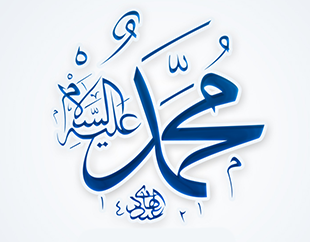
Mohammed, Muhammad or Muhammed is the last prophet and messenger of God to humanity with the last of the monotheistic religions, Islam. His greatest miracle is the Qur'an, the holy book of Islam. And from the acts and words of the Prophet (pbuh) that Muslims take the Sunnah Nabawiya.
Birth and childhood
Muhammad was born on 12 Rabi 'al-Awwal in the year is named the elephant ('am Al Fil), which corresponds roughly to the year 571 of the Gregorian calendar in Mecca. (This date is commemorated during Mawlid Annabaoui).
His father Abdullah Bnou 'Abd al-Muttalib of Banu Hashim was part one of the tribes of Quraish, he married Amina Bint Wahab and died young before she gives birth to the prophet.
At birth, Mohammed was entrusted to Halima Saadia who became his nurse as was the custom in Arabia to entrust newborns to nurses nearby villages.
His mother died when he was only 6 years old, he was then raised by his grandfather Abd al-Muttalib and after his death, by his uncle Abu Talib.
Youth
The uncle of Muhammad (pbuh) was poor, he had to work from his youth to help meet the needs of the family, he was first a shepherd before working in the trade. From his youth, Muhammad (pbuh) was known to the tribe of Quraysh by his sincerity, they called him "Al Amine" (the one who can be trusted).
Khadija, a rich lady of Quraysh, gave him her trade caravans so that would he manage her business, she was impressed by his honesty and integrity, and it was she who proposed to marry him. Mohammed was 25 years old when she was 40. Their marriage lasted 25 years until the death of Khadija, the prophet hardly married another woman until her death. Khadija was not only the first woman but the first person to convert to Islam.
The period of the da’wa
The prophet Mohammed was used to go to meditate in a cave called Ghar Hiraa near Mecca. It was there that one day he was 40 years old, the angel Jibril (Gabriel) visited him with the message of God. The first verses of the Qur'an were revealed to the prophet were those of Surah Al-Alaq: "Read! In the Name of your Lord, Who has created, Has created man from a clot. Read! And your Lord is the Most Generous, Who has taught by the pen, Has taught man that which he knew not."
The revelation of the Qur'an (word of Allah) to the prophet through Jibril lasted 23 years.
Muhammad (pbuh) began to preach the word of God and call the people of Mecca to convert to Islam in secret at first not to provoke the ire of Quraysh who were powerful.
But three years after the first revelation, God ordered him to make his preaching public, which triggered the anger of the leaders of Quraysh who worshiped statues and hardly accepted the teachings of the monotheistic religion preached by the Prophet.
The number of converts to Islam grew in Mecca and its surroundings along the Quraysh persecution against Muslims, which prompted the prophet to leave Mecca with his followers towards Medina, then called Yathrib after 14 years of call to Islam.
This exodus called Hijra Nabawiya took place in the year 622 of the Gregorian calendar, and it is this year that will eventually become the first of the Muslim calendar.
The Prophet (pbuh) and his companions were welcomed with open arms by the Muslims of Yathrib who were called Al Ansar, their city was named Medina "Madinat Arrasoul" (the city of the Prophet).
And it is from this town that were established the foundations of the Muslim state and that the fighting was undertaken which would lead eventually to defeat Quraysh and spread Islam in Mecca and most Arab tribes surrounding.
The period of the Da'wa lasted 23 years during which the Quran was revealed to the Prophet to his last pilgrimage called Hajjat Al Wada' (Farewell Pilgrimage) where the last verses were revealed.
The death of the prophet
Shortly after this pilgrimage called Farewell, the Prophet (pbuh) fell ill, he died a few days later on the lap of his wife Aisha the 8 of June 632 corresponding to Rabi' al-Awwal in the year 11 of the Hegira.
He left a great legacy to the Muslims in the Muslim religion and its precepts.
His succession was assured by his loyal companion Abu Bakr.
Written by: Ali Youssef

Comments